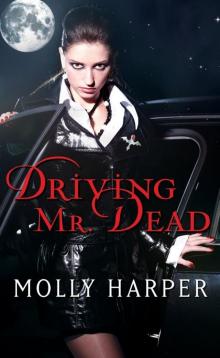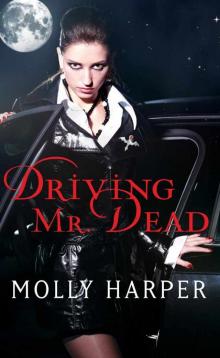- Home
- Molly Harper
Save a Truck, Ride a Redneck
Save a Truck, Ride a Redneck Read online
Thank you for downloading this Simon & Schuster ebook.
* * *
Get a FREE ebook when you join our mailing list. Plus, get updates on new releases, deals, recommended reads, and more from Simon & Schuster. Click below to sign up and see terms and conditions.
CLICK HERE TO SIGN UP
Already a subscriber? Provide your email again so we can register this ebook and send you more of what you like to read. You will continue to receive exclusive offers in your inbox.
For David, who is my unicorn
The McCready Family Tree
1
LAKE SACKETT, GEORGIA, MAY 2006
IF MARIANNE McCREADY drove any slower, the Georgia Highway Department was going to slap a “derelict” sticker on the back of her cute little red Mustang and call it a day.
Marianne slumped back in the plush leather seat, tapping her hands nervously against the sun-warmed steering wheel. It wasn’t that she didn’t love driving fast. Hell, under normal circumstances she’d be zipping through the north Georgia hills, yelling “Bette Davis Eyes” at the top of her lungs. But she wasn’t exactly in a hurry to reach Lake Sackett.
In fact, she’d used every excuse imaginable to avoid coming home for the summer. She liked her life in Athens. She liked her job, clerking for a respectable criminal law firm while she waited to start law school. Her landlord would have been more than happy to give her a three-month summer extension on her apartment until she had to move to Columbia, South Carolina, for law school. But here she was, driving back to her muddy little hometown, because Donna McCready could guilt-trip a deaf and blind man.
The Mustang was the embodiment of everything she loved about her life away from Lake Sackett. Her car was sleek. Her car was new. Her car smelled of the “Clean Cotton” Yankee Candle gel air freshener. Her car was rapidly approaching what looked like four white-tailed deer standing in the middle of the highway.
Oh, holy hell.
Gripping the steering wheel tight, Marianne quickly scanned the road. There was a ravine on her left and a solid wall of granite on her right. Every nerve ending in her brain screamed at her to slam on the brakes and jerk the wheel right to avoid the animals—who were responding the way deer normally responded in these situations: standing still and making absolutely no effort to avoid violent, car hood–related death. But instead, she forced herself to take her foot off the gas and keep the car on course. And she smashed her fist on the horn, honking like she’d never honked in her life.
Three of the deer seemed to see this noise as the herald of doom that it was and hauled ass toward the ravine, leaping out of sight. But one doe just stood there, near a blind curve that made it too dangerous to veer into the oncoming lane, staring directly at Marianne, making eye contact, practically daring her.
Marianne eyed the ravine to the left, the expanse of exposed stone to her right, and the deer, which would crash through her windshield and possibly smash her. And then she glanced at the ravine again, and the rocks, and the rapidly approaching deer.
“Sonofabiscuit.” Grunting, Marianne veered right, squealing as the passenger side scraped against the rocks. The rear of the car fishtailed as the impact slowed down her momentum. She waited for the airbag to deploy, but apparently she wasn’t traveling fast enough for the car to get indignant about a little contact with a mountain. Marianne hit the brakes as hard as she dared, slowing the car without sliding toward the drop-off.
If she made it, she was going to write a very stern letter about the lack of guardrails to . . . whoever handled that sort of thing. While she was mentally composing that letter, at the very last minute, the stupid doe blithely stepped out of the way.
Meanwhile, Marianne’s car was grinding against the rock like a day-shift stripper. The front tire buckled under and Marianne jerked forward in her seat as the car skidded to a stop. Outside the window, the doe was blinking innocently at her through the glass. Marianne forced her hands to release their white-knuckle grip on the steering wheel, an effort made easier by the sweat slicking her palms. She slid the gearshift into park, not that it mattered much at this point. The deer cantered across the road and daintily picked her way into the ravine to join her friends.
“You better run, you knock-kneed bitch!” Marianne hollered after the deer. She groaned, flopping her head against the steering wheel. And then she remembered that the airbag still hadn’t deployed, so she very slowly sat back in her seat. And then pushed the button to move the seat backward, until she was practically laying her head against the backseat. Though the engine had whined to a stop, something clanged under the hood with a loud yaawwwrllll. White smoke billowed over her windshield in a thick curtain.
Marianne had just murdered her car for a stupid deer, who didn’t even appreciate the sacrifice she’d made.
“Dammit,” she muttered, bouncing her head against the headrest. “Dammit. Dammit. Dammit.”
For just a second, she wondered if she could restart the engine and drive as far as town like this.
And then, the airbag burst out of her steering wheel with a deafening POP. Marianne shrieked and covered her face with her hands.
That would be a no, then.
She shook out her trembling fingers, forcing deep breaths into her lungs. She was okay. She wasn’t hurt. She was okay. She was shaky from adrenaline and unprocessed panic, but she was okay.
She glanced around for a mile marker or a landmark. At the very least, she knew she was too far to walk to town in her cute little Steve Madden heels. And with the way the roads twisted and turned, it wasn’t really safe to walk anyway. Tourists didn’t exactly know how to handle themselves on the curves in rental vehicles.
Marianne fumbled for her purse, trying to feel for her cell phone. Maybe she could catch Duffy, or her father, if he wasn’t busy with a procedure. Duffy had all kinds of fancy towing hookups on his truck for hauling his bass boat around. Surely it could handle her little sports car. Besides, a ride into town with Duffy would give her a chance to suss out exactly how pissy the rest of the family was going to be about the fact that Marianne hadn’t been home since her annual drive-by Christmas visit. And they could discuss Duffy’s marriage, which, honestly, could occupy their conversation all the way to the Canadian border.
Marianne prayed that her phone got some reception out here in the hills, because service was about as reliable as secondhand lightbulbs. To her relief, the call actually connected and rang. She felt like she was able to breathe for the first time since seeing the damn deer.
“Yello,” Duffy drawled in the phone. Marianne rolled her eyes, though there was a small smile quirking her lips. Duffy only answered that way for family.
“Duff, it’s Manny. I was on Route 19, headin’ your way. I’m not even to Norm Hightower’s place, and my car broke down.”
“What? I thought that thing was brand-new.”
“Well, it didn’t so much break down as I hit something.”
“Are you okay?” Duffy asked, his voice spiking with anxiety.
“I’m fine, I promise. I’m fine.”
“Was it a deer?” he asked. “They’re running crazy right now, going after extra food. Fawning’s got ’em all stirred up. They don’t even care about daylight.”
“I did not hit a deer. I decidedly didn’t hit the damn deer,” she muttered, throwing a baleful look toward the ravine.
“What in the hell does that mean?” Duffy demanded.
“Duffy, just come out here and help your sister. Bring the truck.”
“But are you okay?” he asked one more time.
“I’m fine, not a scratch. My car
is a different story. Just bring the truck.”
“All right, I’ll be there as quick as I can. Just sit tight.”
“Okay.” Marianne ended the call and flopped her head back against the seat. “Dammit.”
Now that the adrenaline and relief were wearing off, the full impact of what had just happened washed over her in a cold, clammy wave. Despite the Georgia heat creeping into the car, she shivered and rubbed her hands over her bare arms.
She was lucky she’d gotten through the impact relatively unscathed. She knew several people from Lake Sackett who had been seriously injured in collisions with deer. Poor Ezra Newcomb had been killed when a deer crashed through his windshield a week after their high school graduation. This could have been so much worse.
On a shallower note, her car was deader than a doornail. Her parents had given her half of the down payment as a college graduation present. Because, even though they could afford to give her the whole car, they insisted that monthly payments would make her value it more.
It was just the way the McCreadys operated. McCready kids were expected to work hard, to earn the legacy their great-grandfathers had left. Marianne didn’t know how the McCreadys handled replacing cars, because no one in her family had ever totaled a car over a damn deer. (She was never going to be able to think the word deer without damn attached to it somehow.) She had some savings but definitely not enough to replace a brand-new car. This was not going to be the summer she envisioned, leisurely working her way through the recommended reading list for first-year law students in between lake outings with her brother. She was probably going to end up slinging fried breakfast sticks in the Snack Shack for Aunt Leslie, praying the tips were enough to buy her a new fender.
An hour went by and Marianne rolled down all four windows to counter the bone-softening heat. She tried to focus on the landscape, the hilly views so familiar from her childhood. She could almost see the expanse of Lake Sackett in the distance. But even without the visual, she could picture the odd fern shape of the inlets carving through the county.
She knew her reluctance to come home was peculiar. It wasn’t as if Lake Sackett was a pit. The water was always clean, clear, and just the right temperature for swimming. The town’s tourism business thrived on its beautiful lake, ample scenic shorelines, and rolling green hills. People flocked from all over the Southeast to fish, sail, and camp, which kept locals employed.
But growing up, Marianne had been determined, like all small-town girls terrified of turning out like their mothers, to leave Lake Sackett in her rearview at the first opportunity. She craved the hustle and bustle of a city with more than two stoplights and businesses that stayed open past nine. She’d refused to be a cliché, like poor Becky Summat, who had to shop in the maternity section for her prom gown. Marianne refused not to have options or choices.
And coming from one of the more prominent families in town hadn’t made growing up in Lake Sackett any easier. She hated the fact that she couldn’t have an embarrassing moment without it being witnessed by ten people who would call her mother before Marianne got home. She hated that she couldn’t gas up her car or shop for condoms without running into someone she’d gone to grade school with. Half of the appeal of attending University of Georgia had been the anonymity. She wanted a job and a life she’d earned herself, not gotten because her boss knew her father or was distantly related to her mother. And of course, there was the tiny stigma attached to being the daughter of the town funeral director.
She was proud of what she’d accomplished. She’d just graduated with her prelaw degree and had an early acceptance into University of South Carolina’s law program. She had her first semester’s classes picked out. She’d found an apartment. She’d even found a Columbia firm that would be willing to take her on as a clerk while she was in school, based on her former boss’s recommendation. Her seven-year plan was blossoming into the kind of life she’d always wanted.
But lately, she’d had to work harder to drum up the enthusiasm for law school. Somehow, waiting another three years to start her professional life seemed to stretch what she wanted out of her reach. When she thought about what she loved doing, it was research. She loved sinking up to her elbows in the law library and finding the key piece of information that was going to help the client. She was less excited about representing accident victims or standing in front of a jury delivering impassioned speeches. But she’d made these plans, cultivated them carefully from nothing, even when her family objected. So she was sticking with them: law school, a great job, a life in a busy, vibrant city where she could grocery-shop anonymously.
Marianne swiped at the sweat gathering on her forehead. She’d already stripped down to her jeans and camisole. Anything else and she’d get arrested for indecent exposure. Then again, the Sackett County Jail had air-conditioning, so maybe it would be worth it.
True to Lake Sackett traffic patterns, not one vehicle had passed by. It was a Sunday afternoon. The weekend people arrived on Fridays and left town before lunch on Sunday. Summer people tended to wait until Thursdays to head into town to stock up on groceries and booze. And locals tried to stay put until Labor Day, when they got their town back.
Marianne pulled her phone out of her purse and checked the time again. She hit REDIAL and was less charmed by Duffy’s familiar greeting.
“Duffy, where are you? I’m sweatin’ my ass cheeks off out here,” Marianne said. “When you finally decide to grace me with your presence, can you bring me a Coke? I’m dyin’ of thirst.”
“I’m sorry, Manny, I got caught up at work. But don’t worry. Help is on the way.”
Marianne was not at all charmed by the nickname Duffy had used since they were toddlers. It was too damn humid for sisterly affection. “So, did you send Daddy?”
“Not exactly.”
And that’s when Marianne saw the old red tow rig barreling up the hill, the faint strains of Elvis echoing off the rocks.
Marianne’s posture sagged, her bare shoulders sticking to the leather of the driver’s seat. “McDuff Marion McCready, you didn’t.”
“Hey, hey, don’t bring my middle name into this!”
“Duffy,” she growled.
“You said you were fine! Look, I had some dentist from Buckhead hemmin’ and hawin’ over a tackle set and I couldn’t leave the shop,” Duffy cried. “And Dad’s busy with Oscar Gaskill, so it was either send Carl or you wait for another couple of hours.”
“Aw, Mr. Oscar died?” Marianne sighed.
“Yeah, I’m sorry. I didn’t think to call you. The service is tomorrow.”
Mr. Gaskill had been the only math teacher who’d been able to coax her into an A average during her twelve years in the county’s public schools. He’d been quirky and unorthodox in his teaching methods, often speaking in the third person when complimenting students’ precalculus work. Marianne had adored him. And Duffy didn’t think to call her?
Marianne pursed her lips, blowing a breath through her nose.
And then Carl Dawson climbed out of the wrecker.
“Duffy, I’m gonna murder you.”
“Why?” Her brother’s tone was far too innocent to be genuine.
“I’m smart enough to use the crematory and get away with it.”
Duffy scoffed. “You would have to have Dad help you. He’d never—”
Marianne jammed her thumb against the cell phone so hard she thought she’d crack the screen, and glared across the road.
Carl Dawson.
The embodiment of all the reasons she’d left Lake Sackett in the first place stepped down from his towing rig and sauntered toward her car. It was wrong for a man’s arms to be that attractive. The rest of him was plenty pleasant to look at, too: a worn Braves baseball cap covered longish light brown hair framing a face carved in merciless angles; a long, narrow nose hovered over thin lips that looked like they’d never once
lifted upward. His default expression was a scowl, one that she used to spend hours coaxing off his face.
But the arms.
Carl’s arms were straight off the covers of the Harlequin novels her grandma kept stashed in her sewing box. Every sinew of his biceps was sharply defined and that shouldn’t have been hot, but when streaked with engine grease and sweat it made Marianne’s knees go weak. He wore a Mason Towing T-shirt under a plaid button-down—both with the sleeves ripped off—and jeans that had seen much better days, which had been his uniform in high school. But unlike most of their classmates (according to the Facebook evidence), Carl seemed to have grown into his lean, rawboned looks without the semi-adult awkward phase.
Meanwhile, Marianne had indulged in pasta three times that week and skipped Pilates.
Life was just not fair.
Marianne resisted the urge to fluff her thick chestnut hair before stepping out of the car. “Hello, Carl.”
Carl nodded sharply. His hair shifted, giving her a glimpse of eyes the calm, clear green seen only in screensaver shots of the Caribbean. “Hey.”
A tiny splinter of hurt wedged its way under Marianne’s skin. Really? “Hey?” That was it? He hadn’t seen her in four years, not since she’d left him sitting on the edge of Deer Tick Bay in his drawers, and he wasn’t even looking at her. Her considerable cleavage was on full display in this camisole, and he was staring at her car.
She cleared her throat, trying to draw his attention away from her Mustang. “How are you?”
“I’m fine.” His gravelly drawl made gooseflesh stand up on her arms, despite the waves of bone-melting warmth rising off the pavement.
Marianne chin-pointed toward his shirt. “I see you’re still working for Mason’s.”
“Bought it.”
Marianne blinked. Carl couldn’t introduce two nickels to each other when they were kids. How in the hell had he managed to buy Wendall Mason’s towing garage? She cleared her throat. “And you didn’t change the name?”

 Better Homes and Hauntings
Better Homes and Hauntings Nice Girls Dont Date Dead Men
Nice Girls Dont Date Dead Men The Care and Feeding of Stray Vampires
The Care and Feeding of Stray Vampires Nice Girls Dont Live Forever
Nice Girls Dont Live Forever The Single Undead Moms Club
The Single Undead Moms Club How to Run with a Naked Werewolf
How to Run with a Naked Werewolf Peachy Flippin' Keen
Peachy Flippin' Keen A Witchs Handbook of Kisses and Curses
A Witchs Handbook of Kisses and Curses Ain't She a Peach?
Ain't She a Peach? Driving Mr. Dead
Driving Mr. Dead Big Vamp on Campus
Big Vamp on Campus Where the Wild Things Bite
Where the Wild Things Bite How to Flirt with a Naked Werewolf
How to Flirt with a Naked Werewolf Nice Girls Don’t Sign a Lease Without a Wedding Ring
Nice Girls Don’t Sign a Lease Without a Wedding Ring The Art of Seducing a Naked Werewolf
The Art of Seducing a Naked Werewolf Nice Girls Dont Have Fangs
Nice Girls Dont Have Fangs Rhythm and Bluegrass
Rhythm and Bluegrass Nice Girls Dont Bite Their Neighbors
Nice Girls Dont Bite Their Neighbors The Dangers of Dating a Rebound Vampire
The Dangers of Dating a Rebound Vampire Undead Sublet
Undead Sublet How to Date Your Dragon
How to Date Your Dragon Accidental Sire
Accidental Sire I'm Dreaming of an Undead Christmas
I'm Dreaming of an Undead Christmas Peace, Blood, and Understanding
Peace, Blood, and Understanding Snow Falling on Bluegrass
Snow Falling on Bluegrass My Bluegrass Baby
My Bluegrass Baby Fangs for the Memories
Fangs for the Memories Save a Truck, Ride a Redneck
Save a Truck, Ride a Redneck Sweet Tea and Sympathy
Sweet Tea and Sympathy Nice Werewolves Don't Bite Vampires
Nice Werewolves Don't Bite Vampires A Few Pecans Short of a Pie
A Few Pecans Short of a Pie And One Last Thing ...
And One Last Thing ... Big Vamp on Campus (Half-Moon Hollow Series Book 7)
Big Vamp on Campus (Half-Moon Hollow Series Book 7) Ain't She a Peach
Ain't She a Peach Love and Other Wild Things
Love and Other Wild Things Driving Mr. Dead
Driving Mr. Dead![[Jane Jameson 03.5] Nice Girls Don't Sign A Lease Without A Wedding Ring Read online](http://i1.bookreadfree.com/i1/04/06/jane_jameson_03_5_nice_girls_dont_sign_a_lease_without_a_wedding_ring_preview.jpg) [Jane Jameson 03.5] Nice Girls Don't Sign A Lease Without A Wedding Ring
[Jane Jameson 03.5] Nice Girls Don't Sign A Lease Without A Wedding Ring Where the Wild Things Bite (Half-Moon Hollow #8)
Where the Wild Things Bite (Half-Moon Hollow #8) The Single Undead Moms Club (Half Moon Hollow series Book 4)
The Single Undead Moms Club (Half Moon Hollow series Book 4)